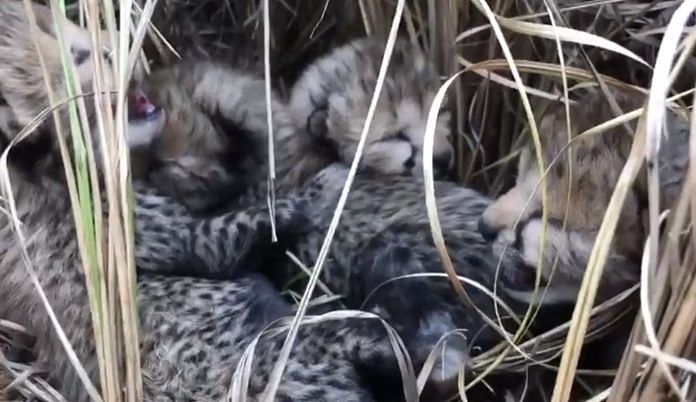New Delhi: One of eight cheetahs relocated to Kuno National Park, Madhya Pradesh from Namibia in September last year, Siyaya, has given birth to four healthy cubs. This comes days after another cheetah from the group, Sasha, died Monday due to a kidney ailment. While this death came as a setback for Project Cheetah — the first and biggest trans-continental conservation experiment of its kind — the birth is a promising development.
Union Cabinet Minister for Environment, Forest & Climate Change Bhupendra Yadav shared the news on social media platform Twitter Wednesday, calling the development a “momentous event in our wildlife conservation history during Amrit Kaal.”
Congratulations 🇮🇳
A momentous event in our wildlife conservation history during Amrit Kaal!
I am delighted to share that four cubs have been born to one of the cheetahs translocated to India on 17th September 2022, under the visionary leadership of PM Shri @narendramodi ji. pic.twitter.com/a1YXqi7kTt
— Bhupender Yadav (@byadavbjp) March 29, 2023
Yadav also congratulated the team working on this rehabilitation project for “their efforts in correcting an ecological wrong done in the past”.
Siyaya is among two cheetahs of the group who are currently pregnant, the other being Asha, a four-year-old wild animal. The gestation period for cheetahs is 90 to 93 days. While Siyaya has delivered the cubs, Asha is expected to deliver between 15-30 April, Yadvendradev Jhala, the scientist who had led the project until last month, told The Telegraph.
While the birth of these cubs within the first six months of the cheetahs’ arrival in India is promising, many wildlife biologists including then project leader Jhala, warn that the chances of survival for first litters to young cheetahs are low and the cubs do not always make it.
“Cubs born early into the project would mean the cheetahs are interacting normally. First-time litters aren’t always difficult — it depends how stressed the mother is,” Adrian Tordiffe, a cheetah specialist at the University of Pretoria, South Africa, who has been guiding the India project, told The Telegraph.
Project Cheetah
Sasha had also been mated in December last year but she died in the same national park due to a kidney ailment. The four-and-a-half years old female cheetah was not keeping well since her arrival more than six months ago, Principal Chief Conservator of Forest (PCCF-Wildlife) J.S. Chauhan said. Wildlife biologists believe kidney failure occurs in cheetahs that have been held captive for long.
“Project Cheetah” was proposed by Indian conservationists and Namibia-based non-profit Cheetah Conservation Fund (CCF) in 2009 and received the nod from the Supreme Court as a pilot project in January 2020. A Memorandum of Understanding (MoU) was subsequently signed between India and the Republic of Namibia in July 2020. The project is aimed at bringing back a species that became extinct in India roughly seven decades ago.
The first batch of cheetahs comprising 8 out of 20 cheetahs to be relocated, arrived from Namibia in September last year while the second batch, bringing 12 others from South Africa, arrived last month.






